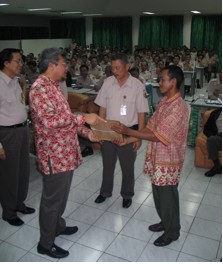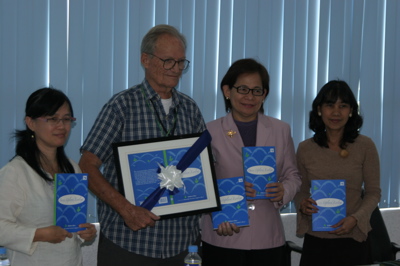“Basic Upland Ecology” was launched last Wednesday (July 25) at the Department of Environment and Natural (DENR) office in Quezon City in simple rites with DENR Undersecretary Teresita Samson Castillo commending its author, American pastor and anthropologist Delbert Rice, for his work of over four decades of serving upland communities in the Philippines.
“The book gains so much more credibility knowing that it is written by a man who has spent the greater part of his life on a personal crusade to protect the environment,” Castillo said in describing Rice’s work.
“It is not just theory on paper but wisdom accumulated from years of living and working in the grassroots, among the very people who are most affected, and who have the power to make a difference,” she noted.
Rice, who has lived in the Philippines since 1956, believes that saving the country’s vast upland areas is the key to saving the environment as a whole. The key is understanding its ecology, which he says simply means “one household.”
DENR Secretary Angelo T. Reyes wrote the foreword of the 166-page book, giving emphasis to the timeliness and simplicity of Rice’s work as the book “explains in simple terms the basic concepts of ecology, its common problems and solutions, and challenges in upland forest management .”
“But it is not simplistic. It is a well-studied and accurate description of how the upland environment works. It should be a required reading for planners and farmers, and a recommended reading for anyone who cares to learn about the environment,” Reyes writes.
The book was first published in 1993 and was reprinted twice in 1994 and 1997 following wide acceptance it got from civic organizations and communities engaged in upland development work.
The third issue of “Basic Upland Ecology” now comes in its revised and expanded English version in response to clamor for the copies of the book from private and public schools, including government offices.
The book actively being promoted by the Non-Timber Forest Products Exchange Programme (NTFP-EP) of which Rice also sits as one of its Board of Directors, has been closely working with the DENR to assist government fine tune its policies especially on matters related to ancestral domain, sustainable harvesting and community management of forest resources.
“The book holds so many possibilities for educational modules on environmental protection for only for NGOs but for so many other sector,” Miks Guia-Padilla, board member of the NTFP Exchange Programme and executive director of NGO Anthrowatch stressed in her welcome remarks.
A masteral degree holder of Anthropology from the Silliman University, Rice has been working with upland communities in Nueva Viscaya since 1975 to improve forest management and livelihood practices, especially among the Ikalahan communities.
Having finished his seminary studies from the Western Evangelical Seminary in Portland, Oregon in 1955, Rice first came to the Philippine the following year as a missionary worker and pastored several protestant churches and oversaw the training of Filipino protestant ministers in Northern Luzon.
In 1965, he moved his family to the Caraballo Mountains in Northern Luzon which marked the beginning of his work with upland communities on forest management, agroforestry and community development.
Rice is a recipient of the Likas Yaman Award from former President Corazon C. Aquino.
The book is published by New Day Publishers which accepts orders for P199 each, through telephone numbers 9288046 and 9275982.
See also:
http://www.denr.gov.ph/article/view/4451


